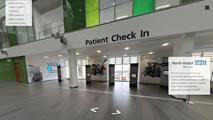Food
North Bristol NHS Trust (NBT) is committed to sourcing local, seasonal, and fairly traded food as part of our trust-wide policy to reduce our impact on the environment while maintaining quality. Through our collaboration with suppliers, we now offer the following food options for our patients:
- Most of our dishes are homemade using locally sourced ingredients, prepared, and cooked in our patient’s kitchen on-site in the Brunel Building.
- Our meat is farm-assured and comes from John Sheppard Butchers in Bristol.
- All our eggs are from free-range chickens.
- Our milk comes from Chew Valley Dairy and its partner farms. The milk suppliers are typically small, family-run farms, all Red Tractor certified. It means that the milk is traceable, safe, and farmed with care.
- Our cheese comes from Wykes Farm in Somerset and is farm-assured.
- Our ham is Red Tractor certified and comes from Houghton Hams in Northampton.
- Fish and fish dishes are from sustainable stocks and come from a supplier in St Philip’s, Bristol.
Our patient menu
We offer a rotating two-week main menu that changes seasonally and includes special dishes for celebrations. All our meals meet the minimum nutritional standards required by national legislation. The menu codes on our main menu indicate dishes suitable for specific dietary needs. You can expect to see the following codes:
- ↑ (The symbol is an arrow pointing up) - Higher energy - these dishes contain more calories and are suitable for patients with a small appetite and patients with increased energy and protein requirements.
- ♥ (symbol is a heart-shaped icon) - Healthier eating – these dishes are lower in fat, saturated fat, sugar, and salt.
- â (symbol is a circumflex a) - Easy to chew – these dishes are suitable for those who have difficulty coping with firm foods due to having no teeth or sore mouths. Not suitable for patients with difficulty swallowing (dysphagia); these patients should refer to the modified texture menus.
- V (symbol is the letter V)- Vegetarian - These dishes are made without meat, poultry, fish, and products derived from these, such as gelatine. Suitable for vegetarians who consume milk, egg, and their products. A vegan menu is also available.
In addition to our main menu, we provide a range of alternative menus to meet the needs of patients who may require a special diet for therapeutic, cultural, or religious reasons, and for patients with allergies. These include:
- Texture modified menus – IDDSI compliant, level four, five, and six.
- Gluten-free.
- Lactose-free.
- Free from 14 major allergens.
- Low potassium/low phosphate.
- Low fibre.
- Vegan.
- Halal.
- Kosher.
- Finger food menu.
- Purple butterfly menu.
Meal service times
- Breakfast times vary depending on the ward.
- Lunch is served between 12:30-13:00.
- Supper is served between 17:30-18:00.
Outside of these times, meals and snacks can be organised by the ward staff. Please ask your nurse or housekeeper.
Snacks and drinks
Extra snacks can be ordered from the main menu and are served with lunch and dinner for later. Other snacks such as soup, bread, and biscuits are available from the ward pantry 24 hours a day.
Hot and cold drinks, including tea, coffee (including decaffeinated), hot chocolate, fruit teas, full-fat and semi-skimmed milk, and squash, are available 24 hours a day and offered at least seven times per day. A water jug will be available at the bedside and will be refreshed twice a day.
Sometimes, because of an operation or as part of your treatment, you will not be allowed to eat or drink. Your nurse will explain this to you.
Meal environment
We have implemented supported mealtimes during which non-urgent clinical tasks such as ward rounds and blood tests are paused to ensure that you are not disturbed while eating. We maintain a quiet environment in the wards to promote a calm dining experience. Visitors are welcome during these times if their presence helps the patient with eating."
We are committed to ensuring your stay is as comfortable and trouble-free as possible. If at any time you need extra help, please let a member of the nursing staff know, for example:
- Assistance in choosing a meal suitable for your dietary requirements.
- Help cutting up your food or extra support and assistance with feeding.
Food from home
For dietary and food safety reasons, we discourage relatives and other visitors from bringing temperature-sensitive food to the hospital for patients. If there are special circumstances, please make sure to get permission from the ward manager before bringing food from home. We will record your request and reach an agreement. Any food that requires refrigeration must be labelled with the patient’s name and consumed within 24 hours.

 You may see many different members of staff at North Bristol NHS Trust.
You may see many different members of staff at North Bristol NHS Trust. 
 Before you arrive at hospital, please make sure you tell us if you have any special requirements, for example:
Before you arrive at hospital, please make sure you tell us if you have any special requirements, for example: